Because of their grossly inaccurate assessments of the Russian president and his country, “Putin Whisperers” in the West have Ukrainian blood on their hands.
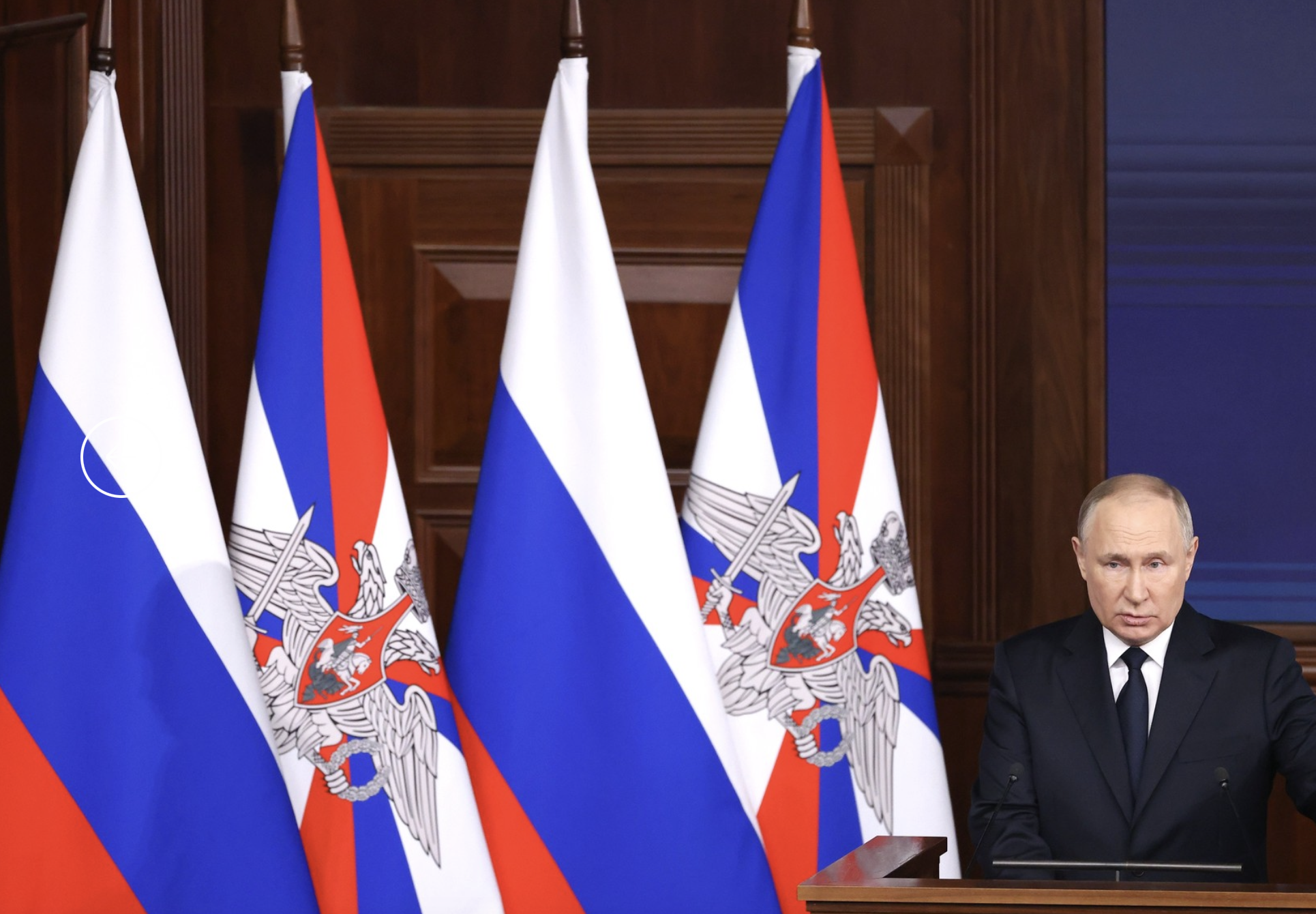
Russian President Vladimir Putin on Tuesday at a meeting of the Defence Ministry Board. (Artem Geodakyan, TASS)
By Scott Ritter
Special to Consortium News
Read Part One of this two-part series.
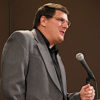 Russians who lived through the 1990s remember the decade quite differently from Michael McFaul, the former U.S. ambassador/Stanford University professor. One such person is Marat Khairullin, a Russian journalist who has reported on Russia since the end of the Soviet Union.
Russians who lived through the 1990s remember the decade quite differently from Michael McFaul, the former U.S. ambassador/Stanford University professor. One such person is Marat Khairullin, a Russian journalist who has reported on Russia since the end of the Soviet Union.
In a remarkable essay published on his Substack account (I urge anyone interested in the reality of modern Russia and the war between Russia and Ukraine to subscribe), Khairullin lays out the connection between the war that McFaul and his fellow critics call Putin’s own, and the Russian people.
Entitled “Russia I am trying to forget,” Khairullin describes a time — the 1990s— where humanity was put on hold because of the corruption and depravations of the Yeltsin government, and reminds his readers that this is the Russia to which McFaul and the other erstwhile Western Russian “experts” want to return, something which Vladimir Putin has sworn to never allow to happen.
The goal of the collective West in promoting and sustaining the Russian-Ukraine conflict is to remove Putin from power and install a Yeltsin-like clone in his stead. Arat’s article serves as a stark warning about the consequences of such an outcome for the Russian people.
For Their Miserable Apartments
Khairullin recalls one assignment, in the early 1990s, where he traveled to “a small Ural town” to investigate an allegation of particular cruelty. “Lonely old people who remembered the Great Patriotic War (WWII) were evicted from their apartments throughout all the Russia,” Khairullin recalled.
“This happened everywhere — Moscow, Balashikha, St. Petersburg, Ufa, Kazan, Vladivostok…but in big cities, old people were spared, forced to assign these damned apartments to new owners and then evicted to live in some abandoned villages. In small towns, old people were simply mowed down.”
Khairullin’s investigation uncovered collusion between the town’s bureaucracy, the local police and the local mafia. “In a very short period of time (just a couple of years) that has passed since Yeltsin’s sovereignty was established in this classic Stalinist industrial town, 136 lonely pensioners had gone missing, and their apartments had changed ownership.”
The local police had a list of pensioners and their apartments. This list was turned over to the mafia, who simply took the pensioner out to the edge of town and murdered him or her. “The person disappears,” Khairullin noted, “after that they immediately clean the apartment up, and the next day they move in, the body of the person has not yet cooled down, but they are already in charge.”
Khairullin had to flee the Ural town in the trunk of a car to avoid being killed himself by the local mafia, who took umbrage at his investigation after being tipped off by the local police.
Khairullin condemns Yeltsin “for the death of these hundreds of thousands of old people abandoned to the mercy of fate,” and believes that the current Russian-Ukraine conflict is being fought in part “simply to make sure that our lonely old people would no longer be killed in the thousands for the sake of their miserable apartments.”
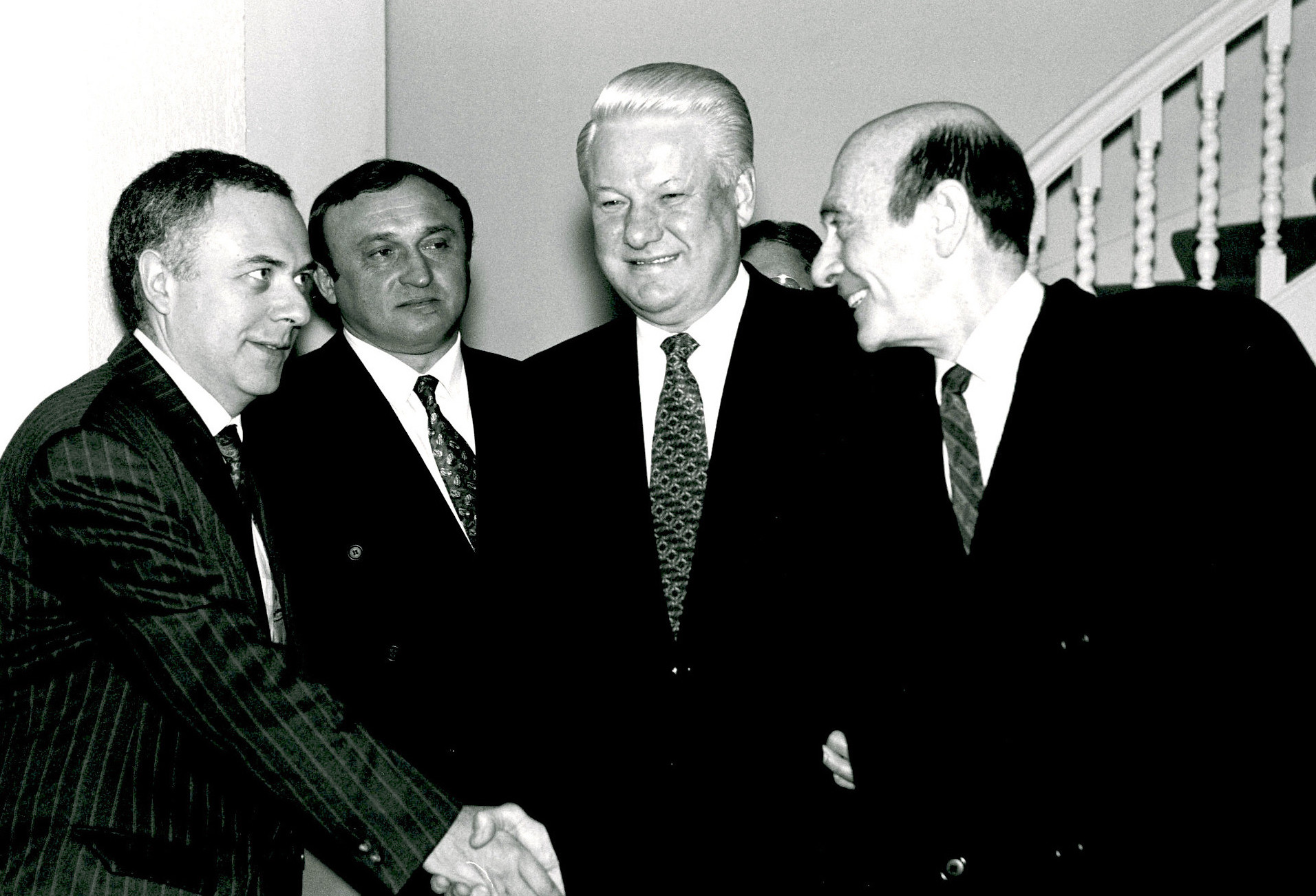
Dec. 9, 1993: Yeltsin, second from right, in Brussels to visit NATO Secretary General Manfred Wörner, on right. (NATO)
Khairullin tells of other experiences gained traveling “around the once great country where Democracy and Yeltsin had won.” One in particular hits hard. “I was a very callous person then,” Khairullin writes. “I almost never cried.”
And then he met Kuzmich, Aksa, and Sima.
Kuzmich was the local senior police officer of “some kind of God forgotten town, an eternal ‘polustanok’ [waypoint] on one of the endless outskirts of Russia.” He took Khairullin on a tour of the local train yard.
“And suddenly,” Khairullin writes, “Kuzmich rushed somewhere to the side, between the carriages, we caught up with him only when he was already dragging a kicking lump out of some hole. ‘Don’t you scratch, little devil, you know I won’t do anything…’ Kuzmich groaned, bringing out a grimy kid at most 8-10 years old into the light of the moon.”
This was Aksa.
Kuzmich took Aksa and Khairullin to the basement of the police building, where he sat the boy down at a table and fed him a sandwich.
“’Wait, that’s not all…’, Kuzmich said. “The door suddenly opened slightly and a girl of about six slipped through the crack and sat down next to Aska and took his hand. ‘Here, meet Sima,’ Kuzmich grinned: ‘I have about thirty of them running around the station here, but these ones are in love … Real love, they hold on to each other — she works in the carriages with shift workers, and this one guards her…Yes Seraphim? How much did you do today? Come on eat…’. Sima just bowed her head and began to smile at the floor quietly…Even then I noted what a nice, childlike smile she had.”
Khairullin and Kuzmich smoked cigarettes while Aksa and Sima ate and drank tea, before falling asleep in their chairs.
“That’s how it is here, correspondent,” Kuzmich said. “The nearest orphanage is half a thousand miles away … Yes, they escape from there…Where to place them…No one cares about them.” Khairullin writes:
“As far as I remember, starting from year 1997, the U.N. annually issued a special report on torture in the police (‘militia’ at the time) — this, of course, was an unfriendly move by the United States, nevertheless, it spoke about the state of the law enforcement system in the country. At the same time more than a thousand people annually died from the bullets of murderers on the streets of the capital city of my tortured country.
And in the very year when Putin became prime minister [1999], another terrible study was released which stated that every third girl in Russia under the age of 18 had the experience of ‘commercial sex.’ This is how Western researchers found a tolerant term to label prostitution in our country.
And there also used to be a slave market in Russia (about 15 thousand Russians were sold annually without their consent) and a special market for sexual slavery — according to various estimates, up to half a million of our girls were held ‘against their will’ in foreign brothels…”
Khairullin also says an unverified number of people, likely in the thousands, were victims of human organ traffickers every year during the 1990s.
Nineties Mortality Rates
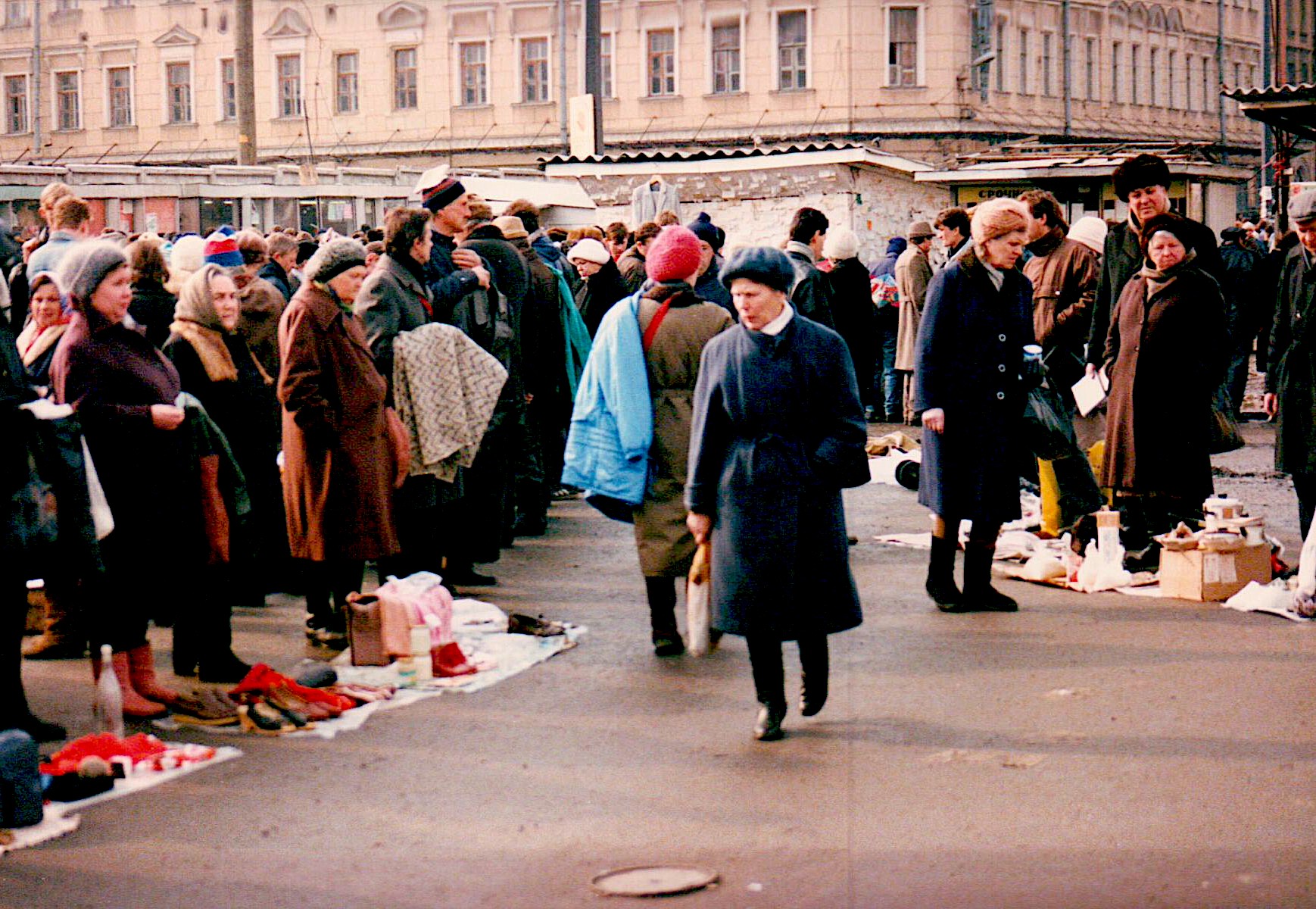
1992 flea market in Rostov-on-Don in southern Russia. (Brian Kelley, CC BY-SA 2.0, Wikimedia Commons)
According to Western researchers, “an extra 2.5-3 million Russian adults died in middle age in the period 1992-2001 than would have been expected based on 1991 mortality.”
This figure does not include infant mortality rates, the fate of missing children like Aksa and Sima, or the murdered pensioners. Altogether, it is believed at least 5 million Russians died as a direct result of the chaos that gripped Russia in the 1990’s — a chaos that Michael McFaul derides as “mythology.”
The 1990s is a reality that Khairullin and the people of Russia will never forget, regardless of how people like McFaul, Applebaum, Kendall-Taylor and Hill try to rewrite history.
Moreover, the linkage between the 1990s and the present in the minds of the Russian people is visceral — they support Russia’s conflict with Ukraine and the collective West not because they have been misled by Putin, but rather because they know their own history — much better than western pundits such as McFaul and company.
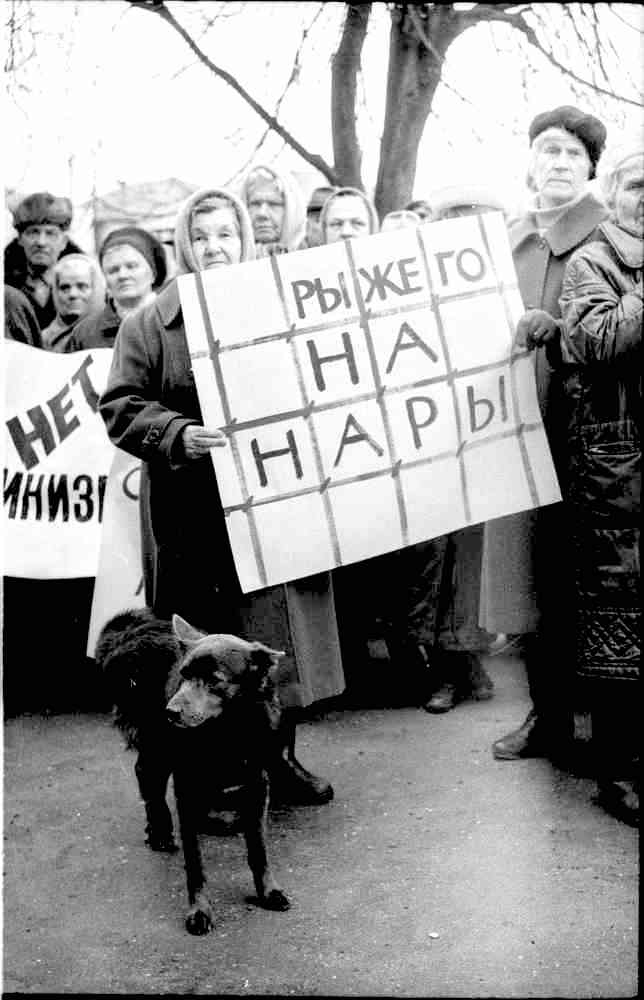
1998: Russians protest the economic depression caused by market reforms with banner saying: “Jail the redhead!” referring to Anatoly Chubais, the Russian economist who oversaw Yeltsin-era privatizations. (Pereslavl Week, Yu. N. Chastov, Wikimedia Commons, CC-BY-SA 3.0)
These pundits, whom I have classified as “Putin whisperers,” have had a hugely detrimental impact on fact-based discourse about Russia today.
“Rather than dealing with the reality of a Russian nation seeking its rightful place at the table of a multi-polar world,” I’ve previously noted, “the ‘Putin whisperers created a domestic market for their personification of all things Russian into the form of a single man” — Vladimir Putin.
“Russia stopped being a national security problem to be managed through effective diplomacy, but rather a domestic political issue which American politicians from both sides of the aisle used to scare the American people into supporting their respective visions of the world.”
What Putin Told David Frost
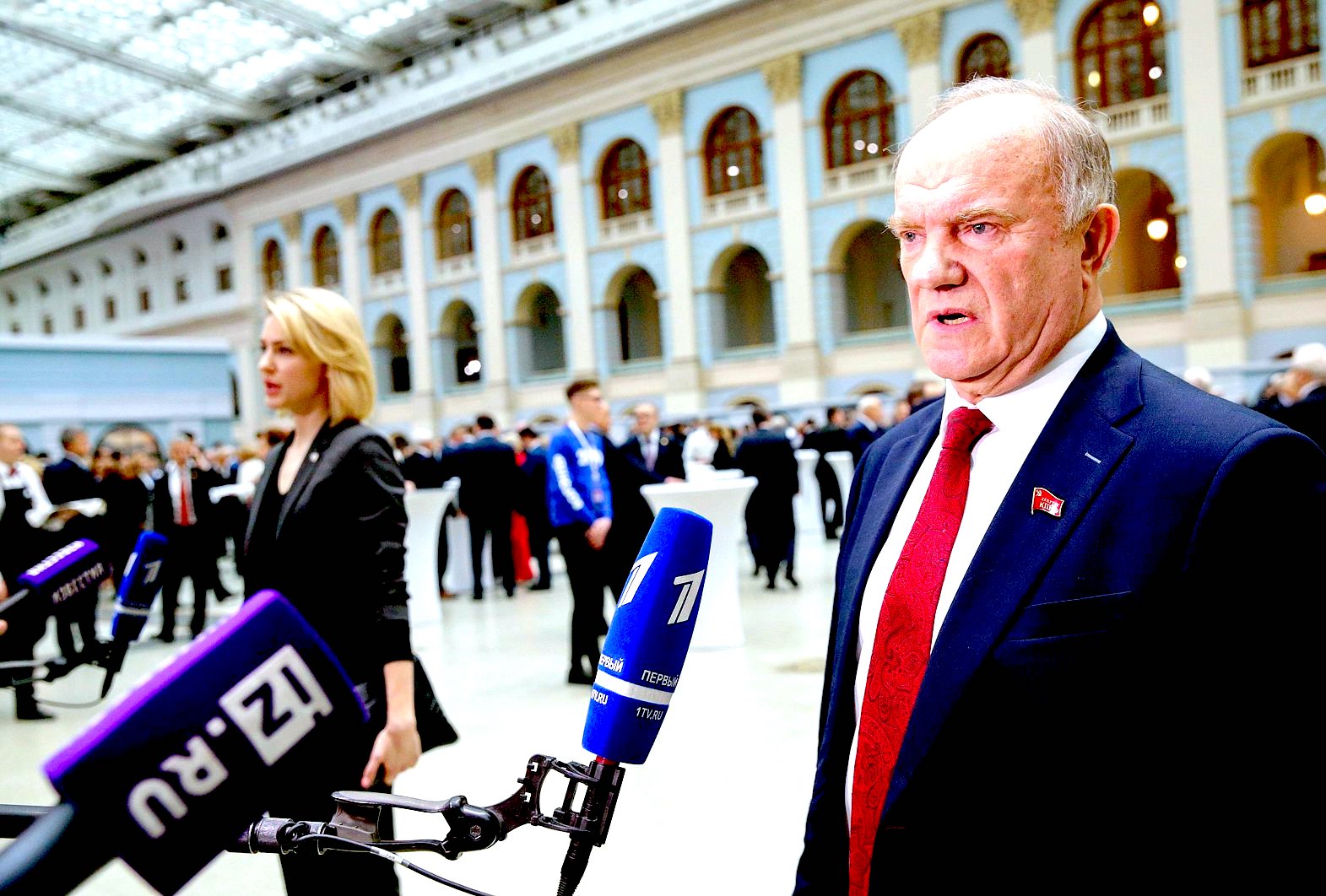
Gennady Zyuganov in February 2019, during Putin’s presidential address to the Federal Assembly. (Duma.gov.ru, Wikimedia Commons, CC BY 4.0)
On March 5, 2000, shortly before Putin was inaugurated following his victory over Gennady Zyuganov, leader of the Russian Communist Party, in the first presidential election following Boris Yeltsin’s resignation, the famous (and now departed) BBC journalist David Frost sat down for an interview with the Russian president-elect. The transcript of this interview is essential reading for anyone who seeks to “speak Putin.”
“My position,” Putin told Frost,
“is that our country should be a strong, powerful state, a capable and effective state, in which both its citizens and all those who want to cooperate with Russia could feel comfortable and protected, could always feel in their own shoes — if you allow the expression — psychologically and morally, and well off.
But this has nothing to do with aggression. If we again and again go back to the terminology of the Cold War we are never going to discard attitudes and problems that humanity had to grapple with a mere 15–20 years ago.
We in Russia have to a large extent rid ourselves of what is related to the Cold War. Regrettably, it appears that our partners in the West are all too often still in the grip of old notions and tend to picture Russia as a potential aggressor. That is a completely wrong conception of our country. It gets in the way of developing normal relations in Europe and in the world.”
Compare and contrast the tone and construct of Putin’s response to Frost with comments made recently in an interview with the Russian journalist Pavel Zarubin, who asked the Russian leader if he would “have been called a naive person in the 2000s?”
Putin answered:
“I had a naive idea that the whole world — and above all, the so-called ‘civilized’ one understands what happened to Russia [after the collapse of the Soviet Union], that it has become a completely different country, that there is no longer any ideological confrontation, which means there is no basis for confrontation.”
“If,” Putin continued,
“something negative happens in the policies of Western countries towards Russia — in particular, support for separatism and terrorism on Russian territory was obvious, I, as director of the FSB, saw this, but in my naivety, I believed that this was simply the inertia of thinking and action. This was a naive view of reality.”
Please Make Your Tax-Deductible DONATION Today
In his discussion with Frost, when the BBC interviewer asked if he viewed NATO as an enemy, Putin answered:
“Russia is part of the European culture. And I cannot imagine my own country in isolation from Europe and what we often call the civilized world. So it is hard for me to visualize NATO as an enemy. I think even posing the question this way will not do any good to Russia or the world. The very question is capable of causing damage. Russia strives for equitable and candid relations with its partners.”
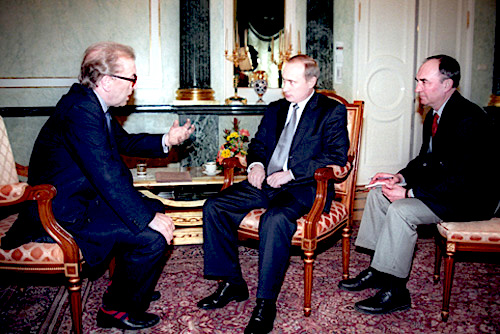
The BBC’s David Frost interviewing Russian President Vladimir Putin at the Kremlin on March 5, 2000. (Kremlin.ru, Wikimedia Commons, CC BY 4.0)
‘Now We’ll Ruin Russia Too’
In his answer to Zarubin, one can detect the disappointment in Putin’s words once the depth of betrayal by his erstwhile “partners” in the West had become clear.
“But the reality is,” Putin said, that “later I became absolutely one hundred percent convinced” that his Western “partners,” following the collapse of the Soviet Union, “thought that we [NATO] needed to be patient a little, ‘now we’ll ruin Russia too.’” Putin said:
“Such a large country by European standards, with the largest territory in the world and a fairly large population compared to other European countries, is generally not needed. It is better — as the famous U.S. politician Brzezinski proposed — to divide it into five parts, and these parts are separately subordinated to oneself and use resources, but based on the fact that everything separately will not have independent weight, independent voice, and will not have the opportunity to defend their national interests the way a united Russian state does. Only later did this realization come to me. And the initial approach was quite naive.”
Putin said Russia’s
“main concern is our own country, its place in the world today and tomorrow. When we are confronted with attempts to exclude us from the process of decision-making, this naturally causes concern and irritation on our part. But that does not mean we are going to shut ourselves off from the rest of the world. Isolationism is not an option. Victory is only possible when every citizen of this country feels that the values we promote yield positive changes in their day-to-day lives. That they’re beginning to live better, eat better, feel safer and so on.
But in this sense one can say we are still very far from our goal. I think we are still at the start of that road. But I have no doubt that the road we have chosen is the right one. And our goal is to follow this road, and to make sure our policies are absolutely open and clear for the majority of the Russian people.”
The fact that the layperson would be unable, in isolation, to readily identify Putin’s statement as part of his answer to Frost or Zarubin underscores the consistency of Putin’s position vis-à-vis Russia’s relations with the West over the course of the past 23-plus years.
It also upends the narrative that Putin has somehow transitioned from one type of leader when he first entered office, to another, more autocratic and isolated leader today. The above quote was from the Frost interview, but it could have been made today, or at any time during Putin’s more than two decades at the helm of the Russian Federation.
Words have meaning. Take, for instance, Putin’s use of the term “Special Military Operation.” It signifies something other than an invasion. Military operations do not rise to the level of full-scale war.
Putin has always sought negotiations with Ukraine — the proof of the pudding, they say, is in the eating: Up until the end of 2021, Putin promoted the Minsk Accords as the preferred mechanism for conflict resolution regarding Ukraine.
Once it became clear that neither Ukraine, France nor Germany (the three signatories to the Minsk Accords) was serious about their implementation, Russia next sought to negotiate directly with the United States and NATO, promulgating two draft treaties which were turned over to Russia’s Western partners for their evaluation and consideration in December 2021.
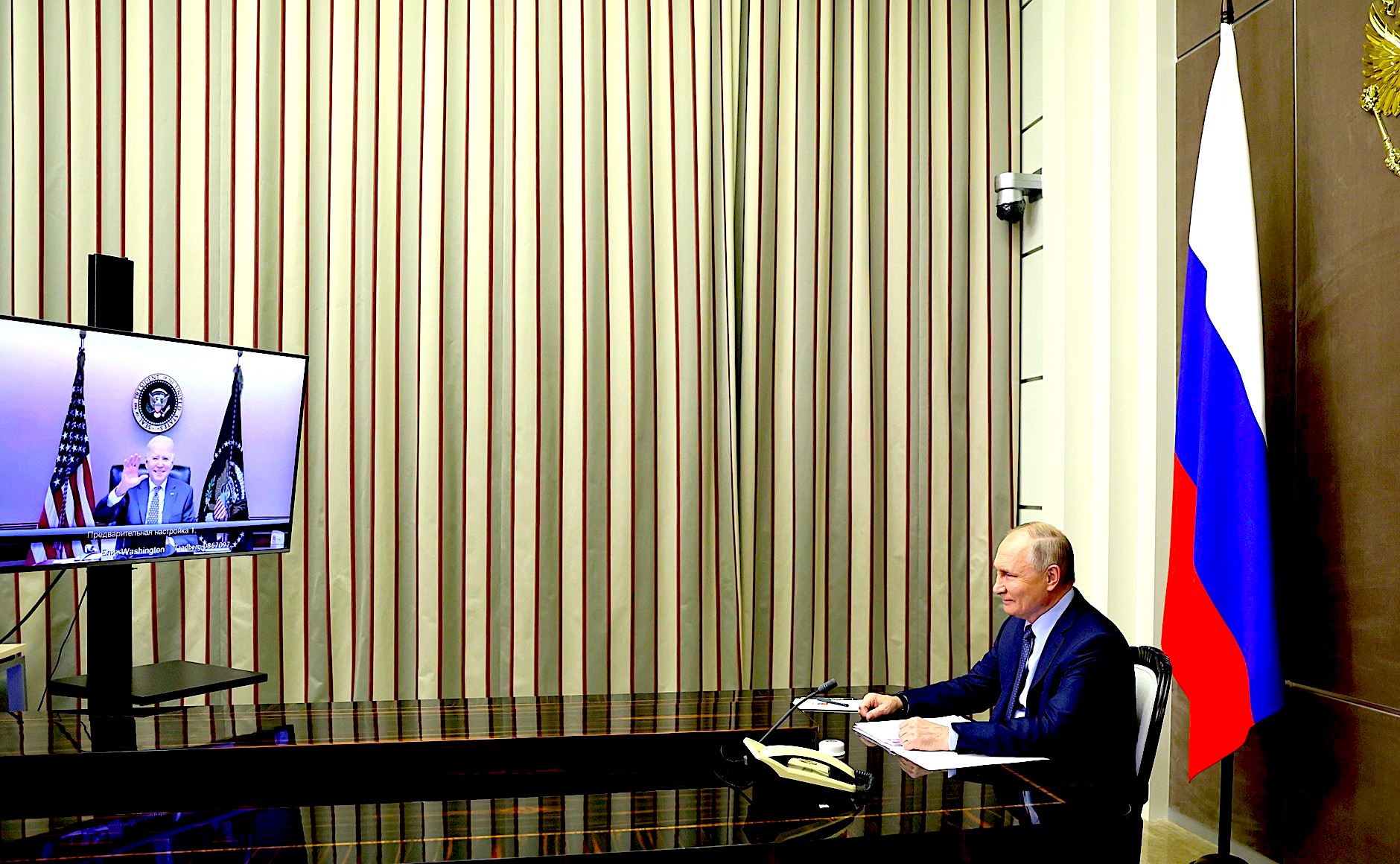
Dec. 7, 2021: U.S. President Joe Biden, on screen during video call with Putin. (Kremlin.ru, CC BY 4.0, Wikimedia Commons)
Both the U.S. and NATO gave short shrift to Russia’s proposals, leading to the decision to initiate the “Special Military Operation” on Feb. 24, 2023. Here is where the importance of words comes into play — rather than seeking the strategic defeat and destruction of Ukraine, which one would normally expect from a military operation of the scope and scale of the one undertaken on Feb. 24.
Whisperers’ Malign Influence
Russia — according to Davyd Arakhamiia, leader of the Servant of the People faction (Ukrainian President Volodymyr Zelensky’s party), who led the Ukrainian delegation during peace talks with the Russians in Belarus and Turkey in March 2022, was willing to exchange peace with Ukraine in exchange for Ukraine refusing to join NATO. Ultimately Ukraine, under pressure from then British Prime Minister Boris Johnson, rejected the Russian offer.
The collective West, not fully comprehending the limitations built into the term “Special Military Operation,”perceived weakness from Russia’s willingness to negotiate. The main reason for this lack of comprehension was the influence that the “Putin Whisperer’s” had on those who wrote the lexicon used to define and decipher Russia’s goals and objectives regarding NATO and Ukraine.
Had they “spoken Putin” (as any genuine expert could, and would), there is a good chance the collective West could have avoided the military embarrassment, economic consequences and geopolitical isolation that has taken place in the months since Ukraine walked away from the peace table.
Because of their grossly inaccurate assessments of Putin and Russia, Hill, Kendall-Taylor, Applebaum, McFaul, and a host of other “Putin Whisperer’s” have the blood of hundreds of thousands of Ukrainians on their collective hands.
Their crime was not just that they did not know how to “speak Putin,” but rather that they deliberately refused to try, instead choosing a path of deliberate obfuscation and deceit when it came to defining Russia and its leader for the western audience.
When advising on issues of national security involving Russia, the failure to “speak Putin” on the part of anyone charged with influencing and/or making Russia policy, borders on the point of criminal negligence.
And if your job is to provide assessments on Russia of a more commercial nature, the failure to “speak Putin” means not only that you’re not very good at your job, but also that perhaps it is time to begin considering finding another career.
Scott Ritter is a former U.S. Marine Corps intelligence officer who served in the former Soviet Union implementing arms control treaties, in the Persian Gulf during Operation Desert Storm and in Iraq overseeing the disarmament of WMD. His most recent book is Disarmament in the Time of Perestroika, published by Clarity Press.
The views expressed are solely those of the author and may or may not reflect those of Consortium News.
Please DONATE to CN‘S Winter Fund Drive



There are people who want to fight all the wars of history over again and it is a culture war likely even a religious war between orthodoxies in Poland and those in Russia. Likely weaponized religious cultural difference. Brzezinski was just using anti-communism in Afghanistan but it really is Polish history with Russia running our war against godless communism that we now see for what it was just another version of Napoleon for war with Russia.
This is not an age for religious war for full spectrum world dominance that NATO is continuing from the colonial imperialism of psst centuries. We should be more committed to secular rule not mythology created by the Roman empire with antisemitism as a basis for defaming entire nations and peoples for superior mythical gods. Defaming leaders for defaming entire peoples in world culture wars.
Whatever the ideas in the heads of American policy makers, the leadership in the departments of the American bureaucracy must have reckoned that the US can’t lose even if the ideas of the policy makers turn out to be wrong since it’s almost entirely Ukrainians and Russians who will be casualties and who will have to deal with the devastation when the guns fall silent. So, American leadership will score this as a win for them and a loss for Russia. The only question for them is whether it will be enough of a loss for Russia to keep Russia from interfering in American designs elsewhere to disadvantage the US, esp. re China. Which is just to say that those who call the shots mostly have no great hostility towards Slavs, just pathological indifference.
The rulers of the US dominated Western imperium have always needed some either domestic or foreign “evil doer” to scare the masses into obedience. It is disconcerting that it still works without much effort. The perception managers must be happily aware of people’s need to believe in the inherent goodness of America. Little do they know that they owe Putin a debt of gratitude for his calmness under pressure and common sense that has prevented the US from starting WWlll.
If we are fortunate, Putin and Jinping will steer us away from Washington’s fantasy dream of “Full Spectrum Dominance.”
Hmmm, the only logical way to pronounce that man’s name—McFaul—seems to me to be pronounced as Mc FOUL. and in reading about him–that makes sense to me. I don’t see evil in Putin—-but our very own Congress seems full of those who relish wars ( as long as they are not in them) .And too, I think they feel more power in the NEGATIVE. When enough of that happens, it seems that nations soon die. : (
To change the topic in light of the Colorado Supreme Court’s decision: “The 2024 election will be the most important since 1860.” — Michael McFaul, panelist on “Shaping America’s Future: Exploring the Key Issues on Our Path to the 2024 Elections”, moderated by Common Sense Media CEO and Stanford professor James Steyer, the talk featured Senator Amy Klobuchar and U.S. House Representative Adam Schiff, who both shared strong concerns about the current state of American democracy – Nov 27, 2023
Thank you Scott and thank you Consortium News.
I’m a 70 year old New Zealander and my understanding of the world has been turned on its head since the Special Operation began. I started off still under the misconceptions and outright lies told to me by the media and then came across Consortium News.
It took me a little while to see through the mist of misinformation and bias as I looked for other sources to either support or debunk the views of the independent journalists.
Truth wins out in the end and people of moral calibre like Scott and the Consortium journalists will win.
If you can teach a person who has had 70 years of indoctrination to see clearly, then certainly there’s hope for humanity. Your efforts are not in vain.
You are winning the misinformation war.
Thank you.
You’re all very brave.
Scott Ritter – The One and Only, it simply can’t be overstated! . . .
I have changed my vision of Russia a lot and to see it as a country in the right side of the recent history and to me Putin is by far the best leader not only for Russia but as a world leader that is saving the rest of the world to go to the caos being promoted by the depraved and failed leaders of the west and maybe in my hopes he will keep democracy and freedom alive and will help the west back to sanity, long life for Putin will be a bless to us all, Edgar Cayce wrote in 1950 that Russia would save the freedom of the world
I am in my 70’s and I can attest that as a nation “blood on our hands” is the key element in our foreign policy. Six million dead in Indochina, for what? One million dead in the Middle East, for what? Afghanistan, Libya, Yemen, Syria, Nicaragua, Chile, Argentina, the Balkans…. every one of them based on lies: Gulf of Tonkin, WMD’s, etc. We all acknowledge the lies of the past, but that doesn’t stop us from believing the lies of today. As a society we eagerly consume the propaganda our government feeds us because we are “the greatest nation on earth,” the hope of mankind spreading freedom and democracy to all the world. The biggest lie of all.
In the US, and seemingly in the Western alliance in general, mediocre and craven individuals with no substance or ability other than self-promotion, are elevated to positions where their malign influence destroys everything of value. This tendency is not new but in recent years, and now in particular with the Biden admin, it has slipped the leash.
Best for the world and its future to embargo any ideas or thinking that originate in America. Choose any venue, it’s all crap. Think that is too harsh? Try to list some positive accomplishments in the last 5, 10 or even 30 years. In any case, it’s not getting better, nor I’m afraid, will it. It’s only getting worse. For example, now we have graduated to supporting and enabling genocide. Tolerance by the world of America’s behavior only enables it further. Beware that.
It’s actually far worse than that, M. Any individuals who are NOT mediocre and corrupt nonentities are actively weeded out. Either jailed for decades on absurd charges like Assange, destroyed as individuals in smear campaigns, like Corbyn, or if all else fails, simply murdered, like JFK and countless others.
That’s why we get people like Biden, Johnson, Trudeau, Schulz, Macron and the rest. Arrogant, venal, irredeemably corrupt, incredibly ignorant, delusional hypocrites and nonentities. Bought and paid for whores serving corporate and Zionist interests. The more easily bribed and blackmailed the better.
And all this in countries which have previously produced great statesman like Metternich, Bismarck, De Gaulle.
It has been evident since the election of Ronald Reagan, the impact of which sent this world into a new direction of peace and security.There is no doubt as Pre. Reagan pulled down the wall, so has the election of a business outsider , exposed the real axis of evil!We now know where the axis starts, soon we will find out where it ends. When we do, we shall know the history of who and what we have become. That in the end,sin will be lying on the world’s doorstep. If you do not think man is vile, then you do not need a Savior.
Semper Fi
These same stupid people are the ones the US corporate newsmedia keeps interviewing.
I don’t believe that U.S. policy makers want to understand anyone. They only understand gunboat diplomacy. You do what we tell you and you can be our friend. If you refuse to do what we tell you, you are then our enemy. And any resistance to our actions will be interpreted as a provocation for war.
Thank you to all.
Agreed, “invasion” was inaccurate to the SMO and part of the failure with “Putin-speak.” The term lends itself to the propaganda of that time–Maniac Putin about to sweep across all of Europe Hitler-style starting with poor, hapless Ukraine. It included the use of “brutal” and “savage” (RFKjr). Details of the moment were brushed aside for the basic PNAC script. Even neutral commentators used it much the way today “Hamas atrocities” of October 7 are routinely condemned though by no means clearly established.
Anti-Putinism has been on the rise particularly since 2016. Now there are tools like this McFaul and his revisionist history. Even worse are the continued corporate media whores insisting to the US public that Putin wants to take over eastern Europe, and after that, who knows, maybe the world! If we don’t keep sending billions to Ukraine, Putin wins! If we don’t help Israel in their genocide, Putin wins! If we don’t vote next year, Putin wins!
It’s all too hysterical. Now there are reasons to not like Putin, but none of them are coming out of western officials’ mouths, instead it’s all hyperbole and fear-mongering. No honest attempts to articulate the views of the Russian people, much less anyone else. They portray Russia as just Putin. It’s no surprise that they revise history to suit the current agenda, if they didn’t they wouldn’t be able to confuse and scare people enough to agree with them. The whole thing is one big farce.
My biggest fear is if Russia prevails this spring in forcing a surrender and follows thru on terms including Ukraine never joins NATO or the EU and becomes a neutral non-aligned state that a humiliated Biden will authorize sending in American and NATO military forces to fight Russia precipitating WW3.
Hmmm. Send in untested, emotionally indoctrinated (USA, WE’RE NUMBER ONE, etc.) troops thousands of miles against a battle-hardened highly motivated (Nazis killed 27,000,000 Russians, Russia and its military constantly denigrated, insulted, contemptuously disrespected) army defending its own country on its own doorstep from an enemy which has sworn to destroy it….what could possibly go wrong ?!?
Americans don’t know war, don’t know chaos, deprivation, mass hunger etc. We haven’t survived the multiple horrors the Russians have since 1941. We were shocked and stunned by 9/11 — 3,000 or so dead. In terms of numbers, not a big deal compared with what Russia and Ukraine come to think of it have had visited on them. If the flaming mediocrities who constitute our military and political policy makers are so deluded as to think we can come out of a face to face war with Russia unscathed (like Vietnam, Grenada), we are headed for an unbearable catastrophe.
This was a good, two-part article. Obviously, our disastrous foreign policy is not based on the idea that the future of the people of the US is so bright that they might not believe their good fortune going forward. It’s based on fear of failure and dividing up the last pieces of the pie left to the scroungers running the country. We’ve been trying to eliminate “the other” for so long in our history that we’ve become “the other” ourselves to the rest of the world. When you look at the methods we are willing to use to keep control over a world that doesn’t need us to control it, it’s pretty obvious we’re about to hit rock bottom. When all that binds us is fear and greed, the force necessary to unbind us is a very low threshold of dissension and want. And all the effort afterwards will be spent in trying to control the narrative allowing this same behavior to continue.
Thank you, Scott Ritter, for this very useful article.
I call out this demonization of Putin in public library discussions here in Florida.
Fools want a comfortable narrative for self-affirmation in their primitive tribal echo chambers.
The same sorts accuse anti-zionists of being anti-Jewish by calling both viewpoints “antisemitism.”
It is necessary to provide forums that present and challenge all viewpoints of major issues.
We do not have that because money controls our mass media and all branches of government.
The US is a severely degraded remnant of democracy.
One solution is the Congress Of Debate (dotcom) where the solution description can be downloaded free.
Thank you Scott and Sam for your instructive article and comment. I suspect there is a secret and disquised connection that explains why the policy of the United States is both Anti-Russian and Pro-Israel. The way I connect the dots there must be immensely wealthy, powerful, and above all ANONYMOUS individuals within (and without) America that promote these two positions. It wouldn’t take many. They are not public figures themselves but they have the ability to influence who is elected to every public office. Our Democracy has been gamed by this secret cartel. By their actions they have left their tracks. Who would hold these two positions?
I’m actually not surprised.
They “didn’t speak” Putin, no doubt.
They were speaking a language grounded in over a century of Washington imperialism. Let’s call it speaking “Washington-Zio-militarist empire.”
Smedley Butler told us it was a racket and Ike warned us.
” Let’s call it speaking “Washington-Zio-militarist empire.” ”
True, but that description doesn’t completely factor in its control by the international banking cartel and Israel, the Zionist project to create a base for their criminal activities.
I could quote Mein Kampf but people would be offended.